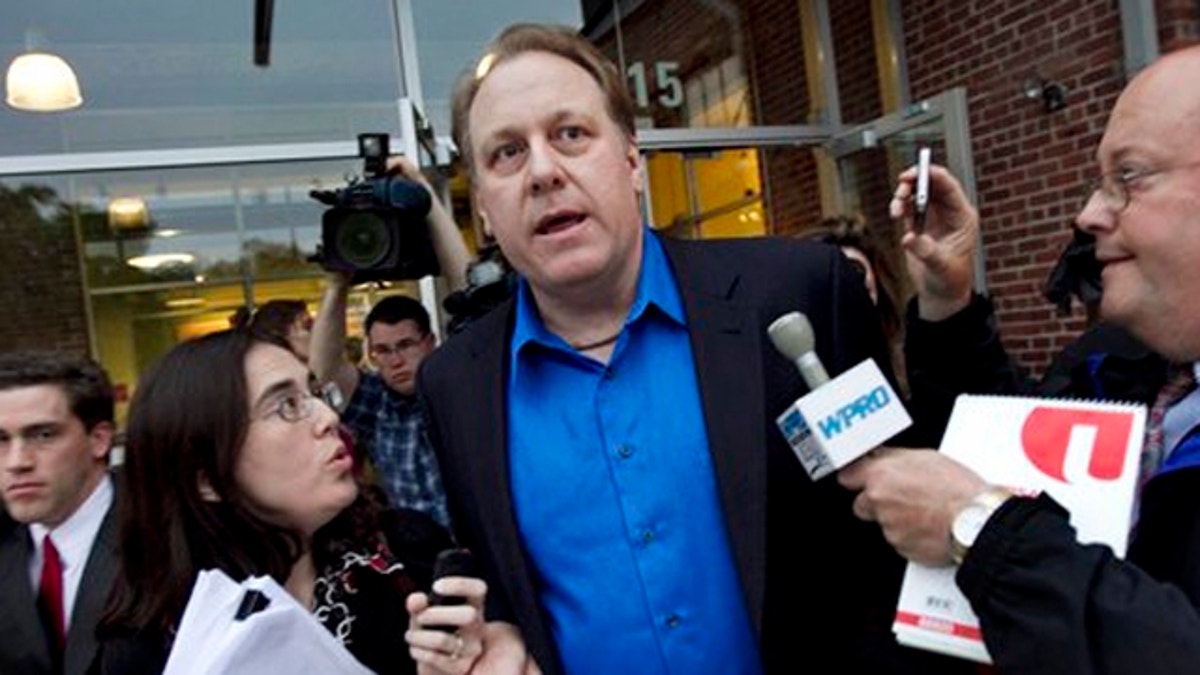
May 21, 2012: Former Boston Red Sox pitcher Curt Schilling, center, is followed by members of the media as he departs the Rhode Island Economic Development Corporation headquarters in Providence, R.I. (AP)
PROVIDENCE, R.I. – Former Red Sox pitcher Curt Schilling's troubled video gaming company, lured to Rhode Island with a $75 million state loan guarantee two years ago, filed for bankruptcy protection on Thursday, and federal authorities have begun an investigation into the firm.
The filing by Providence-based 38 Studios, which laid off its entire staff last month, was made in U.S. Bankruptcy Court in Delaware, where the company is incorporated as a limited liability corporation. Its sister operation in Baltimore also filed for bankruptcy.
The Rhode Island company owes $150.7 million and listed its assets at $21.7 million, according to court filings. 38 Studios Baltimore owes more than $121.4 million and has assets of more than $335,000, the filings show.
The company is seeking liquidation. In both filings, the firm lists its biggest liability as $115.9 million in debt from bonds backed by the state, interest on the bonds and fees to Rhode Island.
Schilling owns 83 percent of the company, according to the filings.
Jim Martin, a spokesman for the U.S. attorney in Rhode Island, said his office had been in contact with the FBI and state police but didn't say exactly what it's investigating.
38 Studios was lured to Providence from Massachusetts in 2010 when Rhode Island officials offered a $75 million loan guarantee they said would bring hundreds of jobs and millions of dollars in tax revenue. The state is likely to be on the hook for some of the company's debts.
In a statement, 38 Studios said the company tried for weeks to find a way to stay afloat but concluded bankruptcy was the only option.
"After ongoing negotiations with the state of Rhode Island and potential investors and other interested parties, the company has been unable to find a solution to the current stalemate," the statement said.
Schilling did not immediately respond to a message left for comment.
The firm last month laid off nearly 300 employees in Providence and more in Maryland. That move came after 38 Studios was more than two weeks late on a $1.1 million payment to the state -- the first indication, state officials have said, that the firm was in financial trouble.
38 Studios has been seeking millions of dollars in tax credits from Rhode Island as it struggled to stay solvent, a request that led to accusations the company was looking for a bailout.
Gov. Lincoln Chafee, who vigorously opposed the loan guarantee in 2010 on the campaign trail, had said he didn't want to give the company any more public support at the risk of throwing "good money after bad."
Christine Hunsinger, a spokeswoman for Chafee, on Thursday described the filing as expected.
"He was well aware that this was one of the possible outcomes," she said of the governor.
Hunsinger said she didn't immediately know what impact the company's bankruptcy filing would have on the state.
The state government recently selected an outside auditor to review the finances of Schilling's company.
Judy Chong, a spokeswoman for the Rhode Island Economic Development Corp., whose board approved the loan guarantee in 2010, did not immediately return a message seeking comment.
The executive director of the agency, along with several board members, resigned last month after the company's troubles came to light.
38 Studios owes more than $2.5 million in wages to employees in Rhode Island and Maryland and $322,000 in federal and state taxes, including $39,000 to Rhode Island, according to the bankruptcy filings.
It owes fantasy writer R.A. Salvatore, who helped develop Schilling's first game, "Kingdoms of Amalur: Reckoning," more than $1.7 million. The game came out to strong reviews in February; Schilling said it beat sales expectations, but Chafee has called it a "flop."
The parent company listed no income from its business operations from Jan. 1, 2010, through May 31 of this year. The Baltimore company listed $22 million in income under a "work for hire agreement" with Electronic Arts Publishing, which published "Kingdoms of Amalur," and $635,000 in royalties during the same period.
Schilling wasn't drawing a salary, the filings show. Chief Executive Officer Jen MacLean was paid $253,000 a year, while President and Chief Operating Officer William Thomas made about $200,000.
